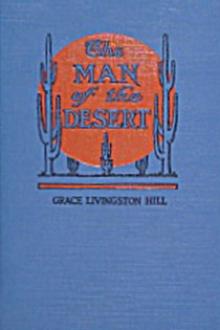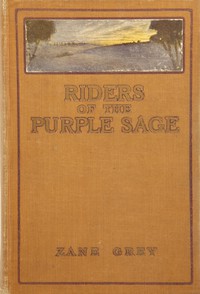The Desert of Wheat, Zane Grey [good non fiction books to read .TXT] 📗

- Author: Zane Grey
Book online «The Desert of Wheat, Zane Grey [good non fiction books to read .TXT] 📗». Author Zane Grey
"Did you see the Governor?"
"Yes, an' he wasn't as anxious about the Golden Valley as the Bend country. He's right, too. We're old Westerners here. We can handle trouble. But they're not Americans up there in the Bend."
"Father, we met one American," said Lenore, dreamily.
"By George! we did!… An' that reminds me. There was a government official from Washington, come out to Spokane to investigate conditions. I forget his name. He asked to meet me an' he was curious about the Bend—its loyalty to the U.S. I told him all I knew an' what I thought. An' then he said he was goin' to motor through that wheat-belt an' talk to what Americans he could find, an' impress upon them that they could do as much as soldiers to win the war. Wheat—bread—that's our great gun in this war, Lenore!… I knew this, but I was made pretty blamed sober by that government man. I told him by all means to go to Palmer an' to have a talk with young Dorn. I sure gave that boy a good word. Poor lad! He's true blue. An' to think of him with that old German devil. Old Dorn has always had a hard name. An' this war has brought out the German cussedness."
"Father, I'm glad you spoke well of the young man," said Lenore, still dreamily.
"Hum! You never told me what you thought," replied her father, with a quick glance of inquiry at her. Lenore was gazing out of the window, away across the wheat-fields and the range. Anderson watched her a moment, and then resumed: "If I can get away I'm goin' to drive up to see Dorn again pretty soon. Do you want to go?"
Lenore gave a little start, as if the question had surprised her.
"I—I hardly think so," she replied.
"It's just as well," he said. "That'll be a hard ride.… Guess I'll clean up a little for supper."
Anderson left the room, and, while Kathleen and Rose gleefully squabbled over the bundles, Lenore continued to gaze dreamily out of the window.
That night Lenore went early to her room, despite the presence of some young people from a neighboring village. She locked her door and sat in the dark beside her open window.
An early moon silvered the long slopes of wheat and made the alfalfa squares seem black. A cool, faint, sweet breeze fanned her cheek. She could smell the fragrance of apples, of new-mown hay, and she could hear the low murmur of running water. A hound bayed off somewhere in the fields. There was no other sound. It was a quiet, beautiful, pastoral scene. But somehow it did not comfort Lenore.
She seemed to doubt the sincerity of what she saw there and loved so well. Moon-blanched and serene, lonely and silent, beautiful and promising, the wide acres of "Many Waters," and the silver slopes and dark mountains beyond, did not tell the truth. 'Way over the dark ranges a hideous war had stretched out a red hand to her country. Her only brother had left his home to fight, and there was no telling if he would ever come back. Evil forces were at work out there in the moonlight. There had come a time for her to be thoughtful.
Her father's asking her to ride to the Bend country had caused some strange little shock of surprise. Lenore had dreamed without thinking. Here in the darkness and silence, watching the crescent moon slowly sink, she did think. And it was to learn that she remembered singularly well the first time she had seen young Dorn, and still more vividly the second time, but the third time seemed both clear and vague. Enough young men had been smitten with Lenore to enable her to gauge the symptoms of these easy-come, easy-go attractions. In fact, they rather repelled her. But she had found Dorn's manner striking, confusing, and unforgettable. And why that should be so interested her intelligence.
It was confusing to discover that she could not lay it to the sympathy she had felt for an American boy in a difficult position, because she had often thought of him long before she had any idea who he was or where he lived.
In the very first place, he had been unforgettable for two reasons—because he had been so struck at sight of her that he had gazed unconsciously, with a glow on his face and a radiance in his eye, as of a young poet spellbound at an inspiration; and because he seemed the physical type of young man she had idealized—a strong, lithe-limbed, blond giant, with a handsome, frank face, clear-cut and smooth, ruddy-cheeked and blue-eyed.
Only after meeting him out there in the desert of wheat had she felt sympathy for him. And now with intelligence and a woman's intuition, barring the old, insidious, dreamy mood, Lenore went over in retrospect all she could remember of that meeting. And the truth made her sharply catch her breath. Dorn had fallen in love with her. Intuition declared that, while her intelligence repudiated it. Stranger than all was the thrill which began somewhere in the unknown depths of her and mounted, to leave her tingling all over. She had told her father that she did not want to ride to the Bend country. But she did want to go! And that thought, flashing up, would not be denied. To want to meet a strange young man again was absolutely a new and irritating discovery for Lenore. It mystified her, because she had not had time to like Dorn. Liking an acquaintance had nothing to do with the fact. And that stunned her.
"Could it be—love at first sight?" she whispered, incredulously, as she stared out over the shadowing fields.
"For me? Why, how absurd—impossible!… I—I only remembered him—a big handsome boy with blazing eyes.… And now I'm sorry for him!"
To whisper her amaze and doubt and consternation only augmented the instinctive recurring emotion. She felt something she could not explain. And that something was scarcely owing to this young man's pitiful position between duty to his father and love for his country. It had to do with his blazing eyes; intangible,





Comments (0)